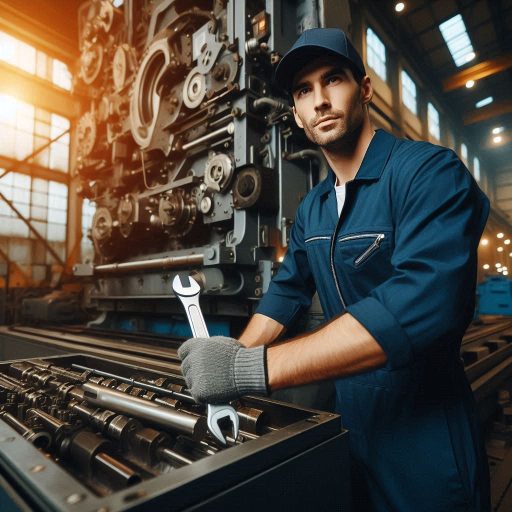Introduction
Overview of Solar PV Installers
Solar PV installers are professionals who specialize in setting up solar photovoltaic systems.
They handle everything from designing the layout and installing solar panels to ensuring the systems function optimally.
Their expertise is essential for making solar energy accessible and efficient for homes and businesses.
Importance of Energy Independence
Energy independence is crucial for reducing a nation’s reliance on imported fuels, which enhances security and stabilizes energy costs.
It also plays a key role in mitigating environmental impacts by reducing greenhouse gas emissions.
Achieving energy independence supports a sustainable and resilient energy infrastructure, crucial for long-term economic and environmental health.
How Solar PV Installers Contribute to Energy Independence
Solar PV installers are pivotal in advancing energy independence by facilitating the adoption of solar power.
Their work enables individuals and businesses to generate their own clean electricity, decreasing dependence on fossil fuels and bolstering the stability of the energy grid.
By expanding solar energy access, they drive the transition towards a more self-sufficient and sustainable energy future.
What is a solar PV installer?
Definition and Role of a Solar PV Installer
A solar PV installer is a professional who specializes in the installation and maintenance of solar photovoltaic (PV) systems.
These systems convert sunlight into electricity, providing a sustainable and renewable energy source.
The installer‘s primary role involves setting up solar panels, connecting them to electrical systems, and ensuring optimal energy output.
They also perform site assessments, design system layouts, and configure panels for maximum efficiency.
The role extends to regular maintenance, troubleshooting, and ensuring compliance with safety standards.
Solar PV installers are essential in advancing renewable energy, reducing dependence on fossil fuels.
Skills and Qualifications Required
Becoming a solar PV installer requires a mix of technical skills and specific qualifications.
A strong understanding of electrical systems is fundamental, as installers need to connect solar panels to the grid or batteries.
They should also be skilled in reading and interpreting electrical diagrams.
Basic carpentry and mechanical skills are necessary for mounting panels on various structures, such as rooftops or ground-based systems.
Familiarity with local building codes and safety regulations is crucial to ensure that installations meet all legal requirements.
Educational requirements typically start with a high school diploma or equivalent.
However, specialized training is often needed to master the complexities of solar PV systems.
Technical schools, community colleges, and trade programs offer courses in solar energy technology, which often include hands-on training.
This practical experience is invaluable for developing the precision and attention to detail required in this field.
Additionally, obtaining certification, such as the North American Board of Certified Energy Practitioners (NABCEP) certification, can significantly enhance job prospects.
Experience in related fields like electrical work or construction can also be beneficial.
Importance of Their Job in the Renewable Energy Industry
The work of solar PV installers is vital to the renewable energy industry.
They play a direct role in transitioning the world towards cleaner, more sustainable energy sources.
By installing solar panels, they help reduce dependence on fossil fuels, lowering greenhouse gas emissions and combating climate change.
Their expertise ensures that solar systems operate efficiently, maximizing the energy output from each installation.
As the demand for renewable energy continues to grow, the role of solar PV installers becomes increasingly important.
They are at the forefront of efforts to achieve energy independence, making a significant impact on both local and global scales.
Read: How to Become a CAD Technician: Step-by-Step Guide
How solar PV installers help in transitioning to clean energy
Installation of Solar Panels to Generate Clean Energy
Solar PV installers are crucial in setting up solar panels that generate clean, renewable energy.
Their work involves placing solar panels on rooftops, land, or other suitable locations where they can effectively capture sunlight.
These panels convert solar energy into electricity, providing a sustainable power source.
By facilitating the installation of these systems, installers help increase the amount of clean energy available for use.
This directly reduces reliance on polluting energy sources and supports a shift towards more environmentally friendly power generation.
Reduce Dependence on Fossil Fuels
Reducing dependence on fossil fuels is a significant contribution of solar PV installers.
Fossil fuels such as coal, oil, and natural gas are major sources of pollution and greenhouse gases.
By installing solar PV systems, these professionals help shift energy production from fossil fuels to solar power, which produces no emissions during operation.
This transition is crucial for lowering the carbon footprint associated with electricity generation.
As more solar panels are installed, the need for fossil fuels decreases, leading to a cleaner and more sustainable energy landscape.
Contribution to a Sustainable Future
The work of solar PV installers is integral to creating a sustainable future.
Solar power is a renewable resource, meaning it can be replenished by the sun without depleting over time.
Unlike finite fossil fuels, solar energy offers a long-term solution to the world‘s energy needs.
By increasing the availability and adoption of solar power, installers help reduce the environmental impact of energy consumption.
This supports global efforts to combat climate change and ensures that future generations will have access to clean, reliable energy.
Through their efforts, solar PV installers play a vital role in building a greener and more sustainable world.
Read: Impact of Drones on Surveying and Mapping
Economic benefits of solar PV installers
Job Creation and Economic Growth
Solar PV installers contribute significantly to job creation and economic growth.
As the demand for solar energy systems increases, so does the need for skilled installers.
This growing industry generates numerous job opportunities, from installation technicians to project managers and sales representatives.
The expansion of the solar sector stimulates local economies by creating new employment opportunities and supporting related businesses, such as manufacturing and distribution.
Additionally, as more solar projects are undertaken, there is a ripple effect that benefits various sectors, fostering overall economic development.
Cost Savings for Homeowners and Businesses
One of the most compelling economic benefits of solar PV systems is the potential for cost savings.
Homeowners and businesses that invest in solar energy can significantly reduce their electricity bills.
Solar panels generate electricity from sunlight, which can lower or even eliminate the need for purchased electricity from the grid.
Over time, these savings can offset the initial investment in solar technology.
Moreover, many regions offer financial incentives, such as tax credits or rebates, which further reduce the upfront costs.
As a result, solar PV systems provide both immediate and long-term financial benefits to users.
Stimulating the Renewable Energy Market
Solar PV installers play a key role in stimulating the renewable energy market.
By increasing the adoption of solar technology, they help drive demand for renewable energy solutions.
This growing market encourages innovation and investment in solar technology, leading to advancements in efficiency and reductions in costs.
As the renewable energy sector expands, it attracts more investors and fosters competition, which can lead to even more affordable and effective solutions.
The efforts of solar PV installers thus contribute to a dynamic and evolving market that supports the broader goal of transitioning to sustainable energy sources.
Read: Field vs. Office Work in Surveying and Mapping

Environmental benefits of solar PV installers
Reduction in Greenhouse Gas Emissions
Solar PV installers play a crucial role in reducing greenhouse gas emissions.
Solar panels generate electricity without emitting carbon dioxide or other pollutants.
By replacing fossil fuels with solar energy, these professionals help lower the amount of greenhouse gases released into the atmosphere.
This reduction is vital for mitigating global warming and improving air quality.
As more solar systems are installed, the collective impact on reducing emissions becomes increasingly significant, contributing to a cleaner, healthier environment.
Conservation of Natural Resources
The installation of solar PV systems also aids in the conservation of natural resources.
Unlike fossil fuels, which require extensive extraction processes, solar energy harnesses sunlight‘a resource that is abundant and renewable.
By relying on solar power, we reduce the demand for finite resources like coal, oil, and natural gas.
This conservation effort helps preserve these resources for future generations and minimizes the environmental impact associated with their extraction and use.
Solar energy represents a more sustainable alternative that supports long-term ecological balance.
Mitigation of Climate Change
Solar PV installers contribute to the mitigation of climate change through their work.
By increasing the use of solar energy, they help decrease the reliance on carbon-intensive energy sources.
This shift is essential for reducing the greenhouse gases that drive climate change.
Solar energy systems produce clean electricity with no direct emissions, making them a key part of strategies to combat global warming.
As more solar installations are adopted, they collectively help slow the rate of climate change, supporting global efforts to achieve climate goals and enhance environmental resilience.
Read: Online Courses for Surveying and Mapping Technicians
Challenges faced by solar PV installers
Regulatory Hurdles and Permitting Issues
Solar PV installers often face regulatory hurdles and permitting issues.
Each region has its own set of rules and regulations for solar installations, which can vary widely.
Navigating these requirements can be time-consuming and complex.
Installers must ensure that their projects comply with local building codes, zoning laws, and safety standards.
Obtaining the necessary permits often involves dealing with multiple agencies and can delay project timelines.
These regulatory challenges can add to the cost and complexity of solar installations, affecting the efficiency of the installation process.
Transform Your Career Today
Unlock a personalized career strategy that drives real results. Get tailored advice and a roadmap designed just for you.
Start NowCompetition with Traditional Energy Sources
Another challenge for solar PV installers is the competition with traditional energy sources.
Fossil fuels like coal, oil, and natural gas have been established for decades and benefit from extensive infrastructure and subsidies.
They often provide a lower-cost energy solution in the short term compared to solar power, which can make it difficult for solar energy to compete on price.
Despite the long-term cost savings and environmental benefits of solar power, the initial investment and perceived higher costs can deter some potential customers.
This competition can slow the adoption rate of solar technology.
Need for Continuous Training and Education
The solar PV industry is rapidly evolving, requiring installers to engage in continuous training and education.
Advances in solar technology, changes in regulations, and new installation techniques necessitate ongoing learning.
Installers must stay updated on the latest innovations, safety protocols, and industry standards to provide the best service.
This need for continual education can be demanding, requiring time and financial investment.
Keeping skills and knowledge current is essential for maintaining high-quality installations and staying competitive in the industry.
Explore Further: Day in the Life of an Automotive Engineer
Role of solar PV installers in promoting energy independence
Empowering Individuals and Communities to Produce Their Own Energy
Solar PV installers play a vital role in empowering individuals and communities to produce their own energy.
By installing solar panels, they enable homeowners, businesses, and local organizations to generate electricity directly from sunlight.
This self-sufficiency allows users to reduce their reliance on external energy sources and control their own energy production.
Empowering people to harness solar energy not only provides them with greater autonomy but also encourages widespread adoption of renewable energy technologies.
Decreasing Reliance on Centralized Power Grids
Another significant contribution of solar PV installers is decreasing reliance on centralized power grids.
Traditional power grids are often vulnerable to disruptions from natural disasters, technical failures, or other issues.
By installing solar PV systems, installers help decentralize energy production, allowing individuals and communities to generate electricity independently.
This reduced dependence on centralized grids enhances the reliability of energy supply and ensures that power is more resilient to interruptions.
Enhancing Energy Security and Resilience
The work of solar PV installers enhances energy security and resilience.
Solar energy systems provide a stable and local source of power that is less susceptible to external threats compared to centralized energy sources.
By increasing the number of solar installations, installers contribute to a more diverse and robust energy landscape.
This diversification helps safeguard against potential energy shortages and disruptions, improving overall energy security.
Additionally, solar power can be particularly valuable in remote or underserved areas where access to traditional energy infrastructure is limited.
Conclusion
The Importance of Solar PV Installers in Achieving Energy Independence
Solar PV installers are at the forefront of the transition to energy independence, playing a pivotal role in harnessing sunlight for clean, renewable power.
Their work directly reduces our reliance on fossil fuels, helping to mitigate climate change and secure a sustainable future.
By converting sunlight into usable electricity, solar PV installers enable households and businesses to generate their own energy, contributing to a more resilient and independent energy grid.
Supporting and Investing in Renewable Energy Technologies
Investing in and supporting renewable energy technologies is essential for achieving a secure and sustainable energy future.
Solar power, in particular, offers a viable solution to reducing carbon emissions and enhancing energy security.
By backing solar initiatives, we contribute to a cleaner environment and drive the shift toward energy independence.
The time to act is now‘let‘s commit to supporting renewable energy and the professionals who make it possible.
Consider a Career in the Solar Industry
The solar industry is booming, offering exciting career opportunities for those passionate about sustainability.
With the increasing demand for solar energy, the need for skilled professionals is growing rapidly.
Consider a career in this dynamic field to directly contribute to the global shift toward renewable energy and help build a cleaner, more sustainable future.
[E-Books for Sale]
The Big Book of 500 High-Paying Jobs in America: Unlock Your Earning Potential
$19.99 • 500 High-Paying Jobs • 330 pages
Explore 500 high-paying jobs in America and learn how to boost your career, earn more, and achieve success!
See All 500 High-Paying Jobs of this E-Book
1001 Professions Without a Degree: High-Paying American Jobs You Can Start Now
$19.99 • 1001 Professions Without a Degree • 174 pages
Discover 1001 high-paying jobs without a degree! Unlock career tips, skills, and success strategies for just $19.99!




